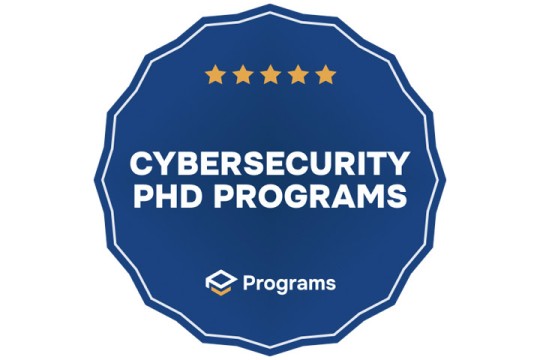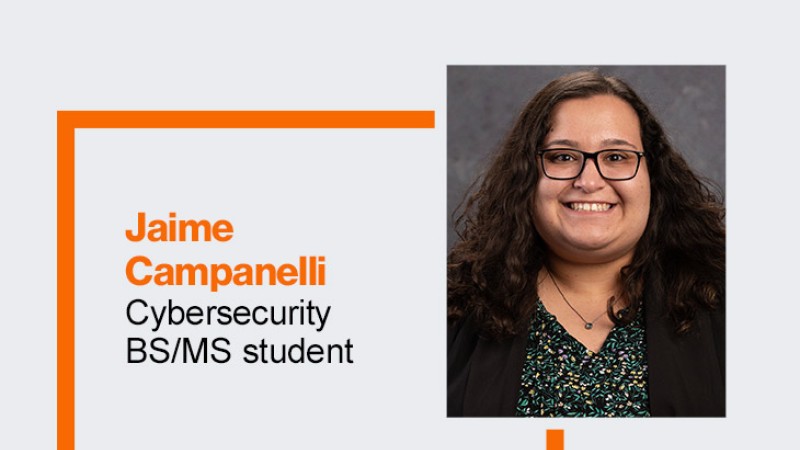Cybersecurity Bachelor of Science Degree

Cybersecurity
Bachelor of Science Degree
- RIT /
- Rochester Institute of Technology /
- Academics /
- Cybersecurity BS
In RIT’s cybersecurity bachelor’s degree you’ll learn to preserve assets, identify security vulnerabilities, prove threats occurred, and design strategies for data recovery.
Overview for Cybersecurity BS
Why Study Cybersecurity at RIT
RIT’s new Global Cybersecurity Institute is one of the world’s leading cybersecurity education and research centers. This 52,000-square-foot, state-of-the-art facility was designed for a holistic, multidisciplinary approach to cybersecurity.
RIT’s Cyber Range and Training Center is capable of hosting more than 5,000 virtual machines simultaneously in immersive scenarios that simulate countless cyber scenarios ranging from industrial to governmental and military.
RIT students are recognized as powerhouse competitors in both offensive and defensive cybersecurity competitions. We won the 2021 Collegiate Penetration Testing Competition Global Finals and the 2013 Collegiate Cyber Defense Competition National Championship.
RIT is designated as a National Center of Academic Excellence in Cybersecurity Research and Education by the National Security Agency.
Tailor your degree around a range of exciting electives like Penetration Testing, AI, and ML.
Accelerated Bachelor’s/Master’s Available: Earn both your bachelor’s and your master’s in less time and with a cost savings, giving you a competitive advantage in your field.
STEM-OPT Visa Eligible: The STEM Optional Practical Training (OPT) program allows full-time, on-campus international students on an F-1 student visa to stay and work in the U.S. for up to three years after graduation.
The scope and demand of computer systems and networks, and the span of these systems, increases in organizations every day. At the same time, dependence on computer systems security and computing security technologies is growing dramatically, as is the creation of malicious software that attacks computing systems and networks. Computer systems security is now a major concern for organizations large and small to ensure information stays secure for the privacy of client/customer information, efficient business success, and smooth continuity in operations. As a result, there is an urgent demand for highly trained computing security professionals who can secure and protect an organization’s digital assets from relentless attack. In addition, there is a critical need for the continued development of advanced computer security technologies, including hardware and software infrastructures, to both house valuable digital assets and ensure their protection.
RIT’s Cybersecurity Bachelor’s Degree
RIT’s bachelor of science in cybersecurity produces professionals who understand the people and processes that impact computer systems security. In addition to acquiring state-of-the-art knowledge in protecting digital assets of large or small organizations, you will learn to proactively identify security vulnerabilities in software, hardware, and infrastructure, and provide and implement actionable solutions that protect the assets of an organization. You will learn to collect digital forensic evidence to reveal network and data breach incidents, attribute the attackers or origin of attack, assess the extent of the damage or loss of information, and design strategies that ensure information is protected from future attacks.
Cybersecurity Curriculum
In the first two years of the program, RIT’s cybersecurity major provides you with a solid foundation in computer science and mathematics. Core courses include a programming sequence, an ethics course, a computer networking and system administration sequence, and foundation courses in computer and network security.
Starting in the third year, you will begin an in-depth exploration of a range of aspects of cybersecurity with advanced electives that allow you to design the focus of your cybersecurity degree. You may choose from an extensive selection of advanced topics in the areas of the network and system security, digital forensics and malware, software security, data security and privacy, and cyber analytics and intelligence. You can expand your knowledge of cybersecurity in one of several disciplines, including network and systems security, digital forensics and malware, security software, and security management. You may also use advanced elective courses to create a customized cluster to address an area of professional interest. To help you apply your cybersecurity courses to the real-world, and gain valuable career experience, you’ll complete two blocks of cooperative education.
ESL Global Cybersecurity Institute: Advancing Cybersecurity Education
As a student in the cybersecurity bachelor’s degree, you'll have the opportunity to take courses and participate in events at the ESL Global Cybersecurity Institute, a state-of-the-art, 52,000-square-foot facility designed for advanced cybersecurity education, training, and research. You will learn from experts who have developed a world-class curriculum that covers cybersecurity to managing information systems as you build secure systems and new technologies. You'll also have access to the Cyber Range, which generates the real world feel of responding to a cybersecurity crisis for governments and industries to test their security and identify innovative/effective solutions.
Careers in Cybersecurity
The cybersecurity field is growing rapidly, with demand for cybersecurity experts outpacing the number of students graduating from cybersecurity majors nationwide. According to the U.S. Bureau of Labor Statistics, employment in cybersecurity will grow by 31 percent by the year 2029, creating excellent career opportunities for graduates of RIT’s cybersecurity degree.
Nearly every single industry needs cybersecurity experts, from aviation and banking, to automotive, health care, energy, retail, education, government, and more. You’ll be well prepared for jobs in cybersecurity as a data scientist, data analyst, information security analyst, cybersecurity engineer, cybersecurity specialist, systems engineer, security architect, application security administrator, artificial intelligence security specialist, cloud security architect, cryptographer, cyber operations specialist, cybercrime Investigator, and more.

Combined Accelerated Bachelor’s/Master’s Degrees
Today’s careers require advanced degrees grounded in real-world experience. RIT’s Combined Accelerated Bachelor’s/Master’s Degrees enable you to earn both a bachelor’s and a master’s degree in as little as five years of study, all while gaining the valuable hands-on experience that comes from co-ops, internships, research, study abroad, and more.
- Cybersecurity BS/Cybersecurity MS: The BS/MS pathway in cybersecurity offers a comprehensive education in this critical and rapidly growing field. The BS program lays a strong foundation, equipping students with essential skills in preserving information assets, identifying vulnerabilities, and conducting digital forensics. Building on this, the MS program delves into advanced topics such as enterprise-level security strategies and trusted computing, as well as research topics like Internet-of-Things (IoT) security and covert communications. This powerful combination prepares graduates to not only tackle complex security challenges but also to guide the industry's future. Through hands-on experience with partner companies and collaboration with research leaders in cybersecurity and AI, students gain real-world skills that are highly sought after by employers. Graduates of this accelerated program are uniquely positioned to become leaders in the cybersecurity field, ready to develop and implement innovative solutions, and protect critical digital infrastructure in various sectors, from finance to national security.
- Cybersecurity BS/Science, Technology, and Public Policy MS: The BS/MS pathway in cybersecurity and science, technology, and public policy offers a unique interdisciplinary approach to addressing digital security challenges. The BS in cybersecurity provides a robust technical foundation, teaching students to protect information assets, identify vulnerabilities, and conduct digital forensics. This technical expertise is then complemented by the MS in science, technology, and public policy, which examines how government and society impact and are impacted by threats and innovation in cybersecurity. Through research opportunities and co-op experiences, students gain practical insights into how cybersecurity and privacy concerns shape industry practices and government policies. This unique combination prepares graduates for diverse leadership roles at the intersection of technology and policy. Alumni are well-positioned to guide organizations in developing comprehensive cybersecurity strategies, influence public policy in the digital realm, and bridge the gap between technical experts and policymakers in both private and public sectors.
- +1 MBA: Students who enroll in a qualifying undergraduate degree have the opportunity to add an MBA to their bachelor’s degree after their first year of study, depending on their program. Learn how the +1 MBA can accelerate your learning and position you for success.
-
Join Us for Accepted Student Open House
Visit campus on March 28 or April 11 to meet faculty, tour campus, and ask your questions.
-
Join us for Fall 2026
There's still time to apply. For some programs, applications will be reviewed on a rolling, space-available basis.
Careers and Cooperative Education
Typical Job Titles
| Assistant Reverse Engineer | Application Security Engineer | Cyber Security Analyst |
| Cyber Threat Responder | Security Software Specialist | Penetration Tester |
| Security Assurance Engineer | Security Consultant | Site Reliability Engineer |
| Threat Analyst | Technical Assessments Consultant | Vehicle Cybersecurity Engineer |
Industries
-
Electronic and Computer Hardware
-
Government (Local, State, Federal)
-
Health Care
-
Internet and Software
-
Medical Devices
-
Telecommunications
-
Utilities and Renewable Energy
Cooperative Education
What’s different about an RIT education? It’s the career experience you gain by completing cooperative education and internships with top companies in every single industry. You’ll earn more than a degree. You’ll gain real-world career experience that sets you apart. It’s exposure–early and often–to a variety of professional work environments, career paths, and industries.
Co-ops and internships take your knowledge and turn it into know-how. Your computing co-ops will provide hands-on experience that enables you to apply your computing knowledge in professional settings while you make valuable connections between classwork and real-world applications.
Students in the cybersecurity bachelor’s degree are required to complete two blocks of cooperative education experience.
Featured Work and Profiles
-
RIT's AI Tools Help Journalists Identify Deepfakes
RIT experts are helping journalists and intelligence analysts detect digital deception
Read More about RIT's AI Tools Help Journalists Identify Deepfakes -
Making Self-Driving Vehicles Safer From Hacking
RIT cybersecurity researchers are preparing connected vehicle networks for the next stage of cybersecurity—the post-quantum era.
Read More about Making Self-Driving Vehicles Safer From Hacking -
Amazon Exec Empowers Next-Gen Cybersecurity Talent
Amazon executive and RIT alum Arthur Deane ’08 (electrical engineering) is helping cybersecurity students unlock opportunities in the rapidly growing tech sector.
Read More about Amazon Exec Empowers Next-Gen Cybersecurity Talent -
CyberCorps Scholar Leads Cyber Safety Outreach
Jaime Campanelli educates students and senior citizens about online safety and cybersecurity careers as a NSF CyberCorps Scholarship for Service (SFS) recipient.
Read More about CyberCorps Scholar Leads Cyber Safety Outreach -
Meet Jonathan Bateman
“...I believe that as technologists, there needs to be a better emphasis on how we use our technology in different spaces because ultimately people are social beings—cultural beings—and the way that...
Read More about Meet Jonathan Bateman
Curriculum for 2025-2026 for Cybersecurity BS
Current Students: See Curriculum Requirements
Admissions and Financial Aid
This program is STEM designated when studying on campus and full time.
First-Year Admission
First-year applicants are expected to demonstrate a strong academic background that includes:
- 4 years of English
- 3 years of social studies and/or history
- 4 years of mathematics is required and must include algebra, geometry, algebra 2/trigonometry, and pre-calculus. Calculus is preferred.
- 2-3 years of science is required and must include chemistry or physics; both are preferred.
- Computing electives are preferred.
Transfer Admission
Transfer applicants should meet these minimum degree-specific requirements:
- A minimum of precalculus is required. Calculus is preferred.
- Chemistry or physics is required.
- Computing courses are preferred.
Financial Aid and Scholarships
100% of all incoming first-year and transfer students receive aid.
RIT’s personalized and comprehensive financial aid program includes scholarships, grants, loans, and campus employment programs. When all these are put to work, your actual cost may be much lower than the published estimated cost of attendance.
Learn more about financial aid and scholarships
Accreditation
Related News
-
February 10, 2026

Top 25 Cybersecurity Bachelor’s Degree Programs (2026)
RIT is highlighted by Programs.com in its 2026 guide to the best bachelor’s degree programs in cybersecurity. The program was ranked No. 8 and noted as a great choice for hands-on education.
-
February 9, 2026

Double Stop wins Ovation: RIT Performing Arts Showcase
Ovation was created nearly a decade ago to push students to be more creative, innovative, complex thinkers, traits that are desirable with prospective employers.
-
January 19, 2026

Top 25 Cybersecurity Ph.D. Programs
RIT is highlighted by Programs.com in its 2026 guide to the best doctoral programs in cybersecurity. The Ph.D. program in computing and information sciences was ranked No. 14 for combining information security research with hands-on application.
Contact
- Rob Olson
- Senior Lecturer, Cybersecurity
- Department of Cybersecurity
- Golisano College of Computing and Information Sciences
- 585‑475‑2735
- rboics@rit.edu
Department of Cybersecurity





















